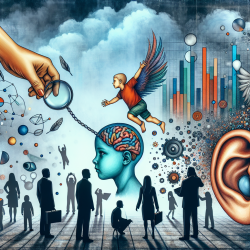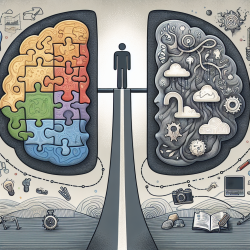The Connection Between Self-Esteem and Depression in Adolescents
Understanding the intricate relationship between self-esteem and depressive symptoms in adolescents can significantly enhance therapeutic outcomes. Recent research, as outlined in the study "The Longitudinal Association Between Self-esteem and Depressive Symptoms in Adolescents: Separating Between-Person Effects from Within-Person Effects," provides valuable insights into this connection. This blog will delve into the findings and discuss how practitioners can leverage this knowledge to improve therapy practices.
Key Findings from the Research
The study utilized random intercept cross-lagged panel models (RI-CLPMs) to separate within-person effects from between-person effects. This approach provided a clearer understanding of how self-esteem influences depressive symptoms over time within individuals, as opposed to across different individuals. The research demonstrated that:
- Low self-esteem is associated with an increase in depressive symptoms over time within individuals, supporting the vulnerability model.
- The effect size of self-esteem on depressive symptoms is small but significant, suggesting that self-esteem may not be a major risk factor over short periods but could have a cascading effect over longer durations.
- The study found no significant scar effects, meaning that depressive symptoms did not significantly impact self-esteem over time within individuals.
Implications for Practitioners
These findings underscore the importance of focusing on self-esteem enhancement in therapeutic settings. Here are some practical applications for practitioners:
- Early Intervention: Identifying adolescents with low self-esteem early can help prevent the development of depressive symptoms. Implementing self-esteem building activities can be beneficial.
- Tailored Therapy: Customize therapy sessions to focus on improving self-esteem, which may indirectly reduce depressive symptoms over time.
- Longitudinal Monitoring: Regularly monitor changes in self-esteem and depressive symptoms to adjust therapeutic strategies accordingly.
Encouraging Further Research
While this study provides significant insights, further research is needed to explore the nuances of the self-esteem-depression relationship. Future studies could investigate:
- The impact of interventions specifically designed to enhance self-esteem on depressive symptoms over longer periods.
- Potential moderating factors, such as environmental stressors, that may influence the relationship between self-esteem and depression.
- The applicability of these findings across different cultural contexts and age groups.
By integrating these findings into practice and encouraging further research, practitioners can contribute to more effective mental health strategies for adolescents.
To read the original research paper, please follow this link: The Longitudinal Association Between Self-esteem and Depressive Symptoms in Adolescents: Separating Between-Person Effects from Within-Person Effects.










